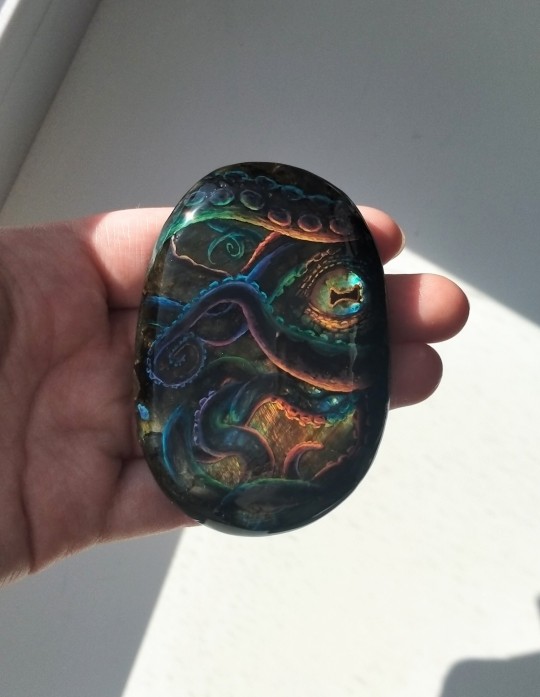Text
You become at least 1% more patient I think when you remember that literally nothing is obvious. Nothing.
4K notes
·
View notes
Text
A thing to try: don't make gods for your fantasy TTRPG setting.
Instead, get each player to tell you the god their character follows, then roll a d6 behind the screen.
6: Their god is real, and as powerful as they believe it to be; maybe they even listen to prayers; maybe they even care. Maybe they care more about if your shellfish wear mixed fabrics.
5: It's a real entity, but whose power is exaggerated - like as a river spirit, but they're worshipped thousands of miles away from it for prayers their expertise with rivers leaves them woefully unprepared to answer
4: It's a powerful demon or dragon or monster of some kind which has tricked people into worshipping it - sure it's powerful, but that power is entirely self-serving, it couldn't answer your prayers if it wanted to
3: It's a person who, through real power, political influence or just straight up charisma, has tricked people into worshipping them, or through a series of misunderstandings has been mistaken for a god against their will
2: It was a long-dead person whose legacy has passed into legend - they may once have been a 3, or they may just have been famous in their life and not seen as godly until long after their death
1: Just a wholesale myth with no basis in reality. Maybe your god started off as a cautionary tale a mother made up to stop her children sucking their thumbs and over the retellings the whole "god of war" thing just sort of happened because of the massive scissors, and now the scissors are gone and all that's left is battlefield chants.
And of course, let the players know about this before you roll. Tell them about their odds, but never tell them about their gods.
4K notes
·
View notes
Text
actually fuck you worldbuilding
world where lines of succession and first-born are extremely important (not just for royalty, but also for common folk, but more emphasis is placed on royalty) because when you die, you can choose to stay behind as a ghost. except only your firstborn child can see and hear you.
royal families are built on this, with long lines of ghosts standing behind whoever the current ruler is. craftspeople who always have their parents in their ear telling them exactly how to be perfect.
this is consistent; a ghost can only see the ghosts it would have been able to see in life, so passing information from generations past is always a game of telephone.
of course this whole thing can be bluffed and exploited in a variety of extremely fun ways.
3K notes
·
View notes
Text
Maybe there should be a show where people land on a cool new planet full of fascinating wildlife and it's actually completely fine and they have a great time. Has anyone explored that possibility.
2K notes
·
View notes
Text

Some Lovecraftian monsters on labradorite. The fact that painting cosmic horror helped me to calm down says a lot about our current situation.
14K notes
·
View notes
Text
There's just a cruelty of this society you don't really notice until you hurt a certain way. Something traumatic happens, something absolutely earth shattering happens that makes you want to curl into a ball and cry and just let yourself work through your hurt, but you're still expected to pay rent. You're still expected to go to work. You're expected to be kind and put on a smile. You're expected to keep paying bills and be a professional be "normal" like. You're never allowed to take a break from it all. You don't get to say I'm having a really hard time right now let me sit this month out. The inhumane way society is constructed. I don't know man I'm just depressed.
2K notes
·
View notes
Text
99% of posters quit before they find the perfect wording no one can misunderstand
11K notes
·
View notes
Text
The spell master: God damn it, where on earth is my magic crystal ball????
The suspiciously hungry and round bug:

3K notes
·
View notes
Text
[guy experiencing the first stage of grief voice] damn i got through the five stages of grief pretty quickly 😄
46K notes
·
View notes
Text
robot4robot but it’s a lifelike combat android who can almost pass for human and her girlfriend who is a massive hexapod mobile artillery unit
3K notes
·
View notes
Note
When you were approaching 40, how did you find meaning in life? How did you find the will to keep going and not think about how fast life was passing you by?
Double down on being inquisitive and kind. Not just towards others, but yourself.
Fill your days with small pleasures that are either unique, or that force you to slow down. Read a book, make a little craft, plant something, go on a walk or ride for at least 30 min.
Deliberately inconvenience yourself, even, to get out of a rut --- get fully dressed and groomed every day, make a meal from scratch, take a new route home.
Be more mindful about what does and does not bring you pleasure. Question what you do out of habit, like a long-played video game or how you dress, and if it actually makes you content or you feel merely obligated.
Find something to go a little feral learning about. Do some research. Go to a library or museum. Meet other people who are just as feral.
We tend to measure ourselves (and get overwhelmed) by the socially standard milestones in life - relationships, children, school, job - but it's how we spend the days in between that really determine how full your life feels.
605 notes
·
View notes
Text
imagine you're some guy and you're going through the woods one day and you stumble upon a house and the people who live there just give you free food and eventually let you inside and it's like nothing you've ever seen before and the people are so nice and loving towards you and then one day they decide to never let you leave again, steal your balls, and give you a stupid fucking hair cut
83K notes
·
View notes




